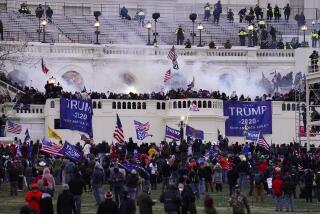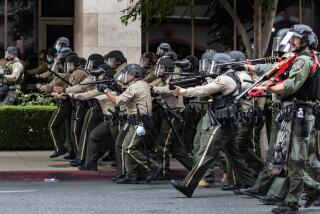A CITY IN CRISIS : Tempers Remain Cool Across Most of Nation After Days of Anger
- Share via
NEW YORK — There were rumors, rallies and random acts of violence. But most of the nation’s largest cities remained calm in the aftermath of the Rodney G. King verdicts.
Atlanta and Seattle were conspicuous exceptions.
Seattle police said 115 people were arrested Friday night and early Saturday morning, during a second consecutive night of isolated civic vandalism. One liquor store was looted, an apartment building in the city’s Capitol Hill neighborhood suffered severe damage in a fire, and youths roamed the downtown streets in bands, smashing windows and skirmishing with police.
Other arson fires were reported during the night, and several downtown merchants boarded their shop windows or removed merchandise from view.
Atlanta authorities reported 370 arrests and 73 injuries--most of them minor.
The Atlanta University Center, a group of predominantly black colleges, closed its campuses to the public Saturday after a two-hour clash Friday evening left 22 people injured and led to 70 arrests.
“Things are very quiet today,” Atlanta police spokeswoman Glenda Lock said Saturday. “The students are meeting among themselves trying to determine what they should be doing next.”
New York City police tallied 121 arrests, 13 serious incidents of violence, and 14 police officers and three demonstrators injured--numbers not out of line for the first warm Friday night of the year.
More than 400 demonstrators marched peacefully through Lower Manhattan on Saturday to protest the King verdicts. The protesters’ leader, the Rev. Al Sharpton, warned that demonstrators would be turned over to police if they caused trouble.
The demonstration came a day after angry protesters broke store windows, overturned at least two cars and threw rocks and bottles at police.
Saturday’s demonstrators, chanting “no justice, no peace” and “New York City, have you heard, this is not Johannesburg,” marched peacefully from police headquarters near City Hall to the federal courthouse.
In Newark, N. J., the scene of 26 deaths during riots in 1967, Mayor Sharpe James said the city’s residents had learned from that violent year.
“We have a Ph.D. in rioting,” James said Friday. “We are living proof that riots destroy cities. It’s taken many years to rebuild.”
More to Read
Sign up for Essential California
The most important California stories and recommendations in your inbox every morning.
You may occasionally receive promotional content from the Los Angeles Times.













